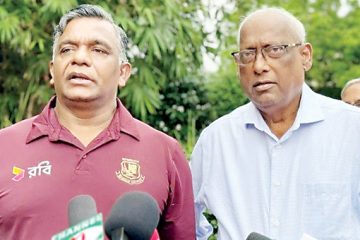‘Try to stick to the basics when things are not going in your favour’. It is an old adage that the New Zealand tail-enders followed to great effect on Thursday, according to Bangladesh left-arm spinner Abdur Razzak. New Zealand frustrated Bangladesh on the second day of the first Test, with significant partnerships in the lower-order coming when the tourists were facing danger, having lost two wickets in the first two overs of the morning.
BJ Watling made the most of an early reprieve after he was caught off a no-ball to score a career-best 103, in the process putting on 57 with Doug Bracewell and 127 with Trent Boult for the eighth and tenth wickets respectively.
The two partnerships at the death came as big blow to Bangladesh, who were hoping for a quick kill after having New Zealand reeling at 282-7.
The last wicket partnership between Watling and Boult was particularly frustrating as it slowly took Bangladesh towards the receiving end of an embarrassing world record.
Mominul Haque finally ended the partnership well short of the world record 163-run tenth-wicket partnership between Australia’s Phil Hughes and Ashton Agar, posted in Nottingham during the last Ashes series in July.
That did not deter Razzak from hailing the batsmen, especially Boult, who made it to 52 not out to become just the 15th number-11 batsman to score a fifty in Test history.
Boult is the second New Zealander to achieve the feat after Richard Collinge, who was unbeaten on 68 against Pakistan in Auckland in 1973.
‘Their last batsman did not try anything extraordinary,’ said Razzak, who finished the innings with figures of 3-147.
‘By the time he played his first drive shot, he already had 27 runs to his name. I think this is why he was successful.
‘Initially he defended every ball. There were a few edges, but the wicket did not offer any turn at all and it was not very difficult to handle the straight ball.’
Razzak lamented the lack of help from the wicket, which mostly favoured the batsmen through the first two days of the match.
‘My understanding is that you need some help from the wicket to get a batsman out in this kind of situation,’ he said.
‘It is more necessary for a tail-ender who comes from outside the subcontinent. They stay cool, unlike a tail-ender from subcontinent.
‘I got the impression that he did not try anything at all. It is really difficult to get a batsman if he takes this kind of approach.’
Razzak, however, will have little to complain about as long as the Bangladeshi batsmen get the same benefit from the wicket.
‘To be quite frank, we did not expect this wicket, but we should not complain as our batsmen are also making good use of it. It should never be an excuse for us.’
-With New Age input




















